|
De Amerikaanse schrijver Edward Everett Hale werd geboren op 3 april 1822 in Roxbury, Massachusetts. Zie ook alle tags voor Edward Everett Hale op dit blog.
Uit: The man without a country
“I have reason to think, from some investigations I made in the Naval Archives when I was attached to the Bureau of Construction, that every official report relating to him was burned when Ross burned the public buildings at Washington. One of the Tuckers, or possibly one of the Watsons, had Nolan in charge at the end of the war; and when, on returning from his cruise, he reported at Washington to one of the Crowninshields,—who was in the Navy Department when he came home,—he found that the Department ignored the whole business. Whether they really knew nothing about it, or whether it was a "Non mi ricordo," determined on as a piece of policy, I do not know. But this I do know, that since 1817, and possibly before, no naval officer has mentioned Nolan in his report of a cruise.
But, as I say, there is no need for secrecy any longer. And now the poor creature is dead, it seems to me worth while to tell a little of his story, by way of showing young Americans of to-day what it is to be
A MAN WITHOUT A COUNTRY.
Philip Nolan was as fine a young officer as there was in the "Legion of the West," as the Western division of our army was then called. When Aaron Burr made his first dashing expedition down to New Orleans in 1805, at Fort Massac, or somewhere above on the river, he met, as the Devil would have it, this gay, dashing, bright young fellow, at some dinner-party, I think. Burr marked him, talked to him, walked with him, took him a day or two's voyage in his flat-boat, and, in short, fascinated him. For the next year, barrack-life was very tame to poor Nolan. He occasionally availed of the permission the great man had given him to write to him. Long, high-worded, stilted letters the poor boy wrote and rewrote and copied. But never a line did he have in reply from the gay deceiver. The other boys in the garrison sneered at him, because he sacrificed in this unrequited affection for a politician the time which they devoted to Monongahela, sledge, and high-low-jack. Bourbon, euchre, and poker were still unknown. But one day Nolan had his revenge.”
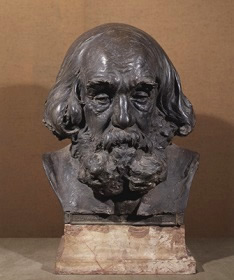
Edward Everett Hale (3 april 1822 – 10 juni 1909)
Borstbeel door Henry Hudson Kitson, 19e eeuw
De Duitse schrijfster en vertaalster Johanna Walser werd geboren op 3 april 1957 in Ulm. Zie ook alle tags voor Johanna Walser op dit blog.
Uit: Die Unterwerfung
„Sie fesselten Lisa, dass sie sich nicht mehr rühren konnte, und sprachen sich ihr vor, dass es Lisa traf wie Peitschenschläge. Lisa stand oft nicht gerecht da, gegenüber manchen, die diese Sätze gesprochen hatten, die Vorwürfe waren oft gerechtfertigt. Auch war es nicht so, dass Lisa die Menschen dafür hassen musste oder konnte, aber die bloße Verletzung würgte sie ziemlich. Manchmal schliefen die Besatzer, auf einmal aber konnten sie aufwachen und ihre Feste feiern in Lisa.“
(…)
„Wenn Lisa abends Musik hörte, war sie gerettet; es kam ihr vor, sie verwandle sich in Musik. Den Schmerz nahm sie dann wie eine Hostie. Dann war sie plötzlich beleidigt – nur weil die Musik sich entrüstete, zuckte wie ein stolzes, misshandeltes Pferd – oder nein, sie täuschte sich, sie war von etwas emporgehoben, das hell auffährt und alles Schwere und Niederdrückende abwirft. Helle Flucht. Jemand spielte Klavier, und eine Musikstelle versetzte Lisa in einen Augenblick, in dem sie alles einfach empfing und alles sie schön berührte, zu ihr kam, an die Augen, sanft. Der Klavierspieler wiederholte diese leise, schöne Musikstelle, wieder und wieder … sie wachte auf und wachte auf, hörte nicht auf gerade aufzuwachen.“

Johanna Walser (Ulm, 3 april 1957)
De Amerikaanse schrijver Washington Irving werd geboren op 3 april 1783 in Manhattan, New York. Zie ook alle tags voor Washington Irving op dit blog.
Uit: Tales of the Alhambra
“The emperor Charles V. com menced a sumptuous palace within its walls, but was deterred from completing it by repeated shocks of earthquakes. The last royal residents were Philip V. and his beautiful queen, Elizabetta of Parma, early in the eighteenth century. Great preparations were made for their reception. The palace and gardens were placed in a state of repair, and a new suite of apartments erected, and decorated by artists brought from Italy. The sojourn of the sovereigns was transient, and after their departure the palace once more became desolate. Still the place was maintained with some military state. The gov ernor held it immediately from the crown; its jurisdiction extended down into the suburbs of the city, and was independent of the captain-general of Granada.
The desertion of the court, however, was a fatal blow to the Alhambra. Its beautiful halls became desolate, and some of them fell to ruin; the gardens were destroyed, and the foun tains ceased to play. By degrees the dwellings became filled with a loose and lawless population contrabandistas, 5 who availed themselves of its independent jurisdiction to carry on a wide and daring course of smuggling ; and thieves and rogues of all sorts, who made this their place of refuge whence they might depredate upon Granada and its vicinity. The strong arm of government at length interfered; the whole community was thoroughly sifted; none were suffered to remain but such as were of honest character, and had legitimate right to a residence; the greater part of the houses were
demolished, and a mere hamlet left, with the parochial church and the Franciscan convent. During the recent troubles in Spain, when Granada was in the hands of the French, the Alhambra was garrisoned by their troops, and the palace was occasionally inhabited by the French commander.
With that enlightened taste which has ever distinguished the French nation in their conquests, this monument of Moorish elegance and grandeur was rescued from the absolute ruin and desolation that were overwhelming it. The roofs were repaired, the saloons and galleries protected from the weather, the gardens cultivated, the watercourses restored, the fountains once more made to throw up their sparkling showers; and Spain may thank her invaders for having preserved to her the most beautiful and interesting of her historical monuments.”
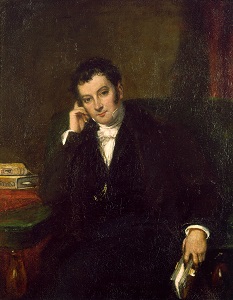
Washington Irving (3 april 1783 - 28 november 1859)
Portret door Gilbert Stuart Newton, 1830
De Engelse priester en dichter George Herbert werd op 3 april 1593 geboren, waarschijnlijk te Black Hall (Wales). Zie ook alle tags voor George Herbert op dit blog.
Mattins
I cannot ope mine eyes,
But thou art ready there to catch
My morning-soul and sacrifice:
Then we must needs for that day make a match.
My God, what is a heart?
Silver, or gold, or precious stone,
Or star, or rainbow, or a part
Of all these things or all of them in one?
My God, what is a heart?
That thou should'st it so eye, and woo,
Pouring upon it all thy art,
As if that thou hadst nothing else to do?
Indeed man's whole estate
Amounts (and richly) to serve thee:
He did not heav'n and earth create,
Yet studies them, not him by whom they be.
Teach me thy love to know;
That this new light, which now I see,
May both the work and workman show:
Then by a sun-beam I will climb to thee.
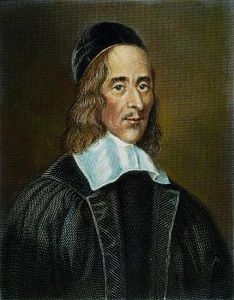
George Herbert (3 april 1593 - 1 maart 1633)
Portret door Robert White, 1674
De Duitse schrijver Josef Mühlberger werd geboren op 3 april 1903 in Trautenau in Böhmen. Zie ook alle tags voor Josef Mühlberger op dit blog.
Uit: Wo ich daheim war. Erzählungen aus dem böhmischen Riesengebirge.
“Heute, vor dem Einschlafen, fiel mir ungerufen ein, was längst vergessen schien, und hier in der Fremde, in der ich seit Jahren lebe, fiel es mir ein. Ich ging den Weg wie damals als Knabe, trat aus dem Garten um unser Haus mit dem von Balsaminen umblühten Zaun, stieg den Hang hinauf, ging durch den Hohlweg, vorbei am Steinbruch mit der fleischroten Mauer unter dem Grün der Sträucher...bis zu Pater Neumann Kreuz. ...In meiner Kindheit war kein Tag gewesen ohne diesen Weg, ...ohne daß ich den Wassertümpel besucht hätte...oft mache ich den Weg in meinen Gedanken beim Einschlafen oder an Regentagen, und gehe jetzt, in der Fremde, nach vielen Jahren, wieder vor dem Einschlafen, als könne ich morgen meinen Wassertümpel besuchen, der auf mich wartet und traurig ist, wenn ich nicht komme. Sehe unter den graubärtigen Ästen einen Knaben übers Wasser geneigt sitzen, die Wangen von der Sonne gerötet wie die Himbeeren am Strauch, die Haare schimmernd wie die Ähren der Gerste und als Gold eingelegt ins Silber des Wasserspiegels. Alles noch wirklich, und doch schon Traum.“
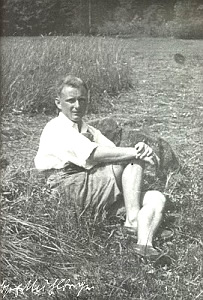
Josef Mühlberger (3 april 1903 – 2 juli 1985)
Tijdens een reis op jongere leeftijd
De Duitse dichter Bodo von Hodenberg werd geboren op 3 april 1604 in Hudemühlen. Zie ook alle tags voor Bodo von Hodenberg op dit blog.
Vor deinen Thron tret ich (Fragment)
Gott Heilger Geist, du höchste Kraft,
des Gnade in mir alles schafft,
ist etwas Guts am Leben mein,
so ist es wahrlich alles dein.
Drum danke ich mit Herz und Mund
dir, Gott, in dieser Morgenstund
für alle Güte, Treu und Gnad,
die meine Seel empfangen hat.
Und bitt, dass deine Gnadenhand
bleib über mir heut ausgespannt;
mein Amt, Gut, Ehr, Freund, Leib und Seel
in deinen Schutz ich dir befehl.
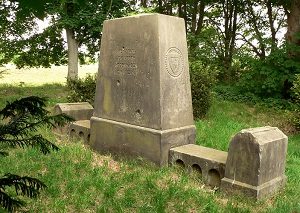
Bodo von Hodenberg (3 april 1604 - 20 september 1650)
Monument ter herinnering aande familieburcht Hodenhagen van het geslacht von Hodenberg
De Duitse koopman en schrijver Friedrich Emil Rittershaus werd geboren op 3 april 1834 in Barmen. Zie ook alle tags voor Friedrich Emil Rittershaus op dit blog.
Auf dem Berge
Nun bin ich auf den Berg gestiegen
Und schau‘ in’s grüne Land hinein.
Im Sonnenschein die Täler liegen;
Die Berge deckt der Sonnenschein.
Im Sonnenschein die Falter scherzen,
Im Sonnenstrahle glänzt der Quell
Und in der Brust, im tiefsten Herzen
Wird’s wieder licht und sonnenhell!
Schon lugt im Wald durch’s herbstlich falbe,
Zertretne Laub der Blüten Pracht;
Schon hat die Lerche, hat die Schwalbe
Der junge Lenz zurück gebracht.
Sie alle sind der Lust Propheten,
Propheten einer sel’gen Zeit!
Aus tausend Pforten seh‘ ich treten
Hin in die Welt die Fröhlichkeit.
Sei mir gegrüßt mit meinem Liede,
Sei mir gegrüßt aus vollster Brust,
Du wunderbarer Frühlingsfriede,
Du wundersame Frühlingslust!
Mit frohem Sinne zum Himmel wende
Ich nun die Augen tiefbewegt.
Mir ist, als hätt‘ mir seine Hände
Ein Engel auf die Stirn gelegt.
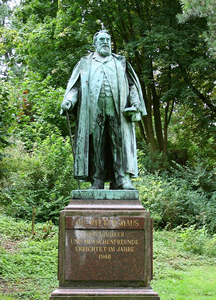
Friedrich Emil Rittershaus (3 april 1834 – 8 maart 1897)
|



